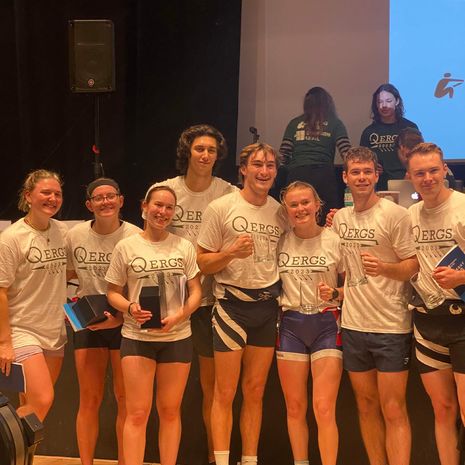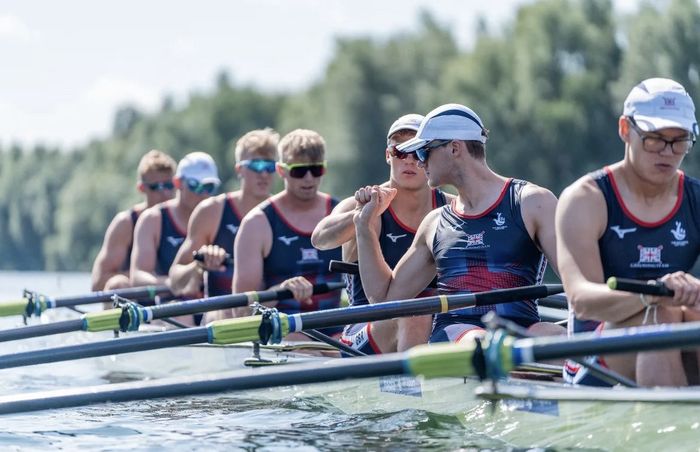Qergs 2023: Been there, done that, got the T-shirt
The annual Queens’ Ergs were held last Sunday, marking the beginning of the Cambridge rowing calendar

Chatter of splits and watts greeted those who headed down Silver Street last Sunday (5/11), as masses of rowers piled into Queens’ College wearing identical white T-shirts. The rowing racing season had now well and truly begun, kicking off with Queens’ Ergs.
The only boating competition held off the water, returning seniors and eager novices battle it out over a 4,000m relay race on ergs, indoor rowing machines which mimic the actions of a rowing boat. Each member of a college crew of eight rows 500m as fast as possible, before jumping off the erg so the next competitor can take their place.
With almost 100 crews getting involved in the competition, the organisers had plenty of work on their hands to ensure the annual competition ran smoothly. As one of the largest indoor rowing competitions in Europe, the effort and coordination of the rowers of Queens’ College Boat Club has to be admired. “It all ran pretty smoothly thanks to our volunteers,” said Flynn Ryan, a third-year student at Queens’. Despite the work involved, he mentioned that “it was great to see everyone really getting into the event,” to the extent where it was so loud that “ear plugs were a must.”
The balconies of Fitzpatrick Hall were filled with spectators, motivating the boaties and contributing to the liveliness of the room. Despite a false start in the senior division and not one but two broken ergs, the spirit of the competition was not lost, making it a welcoming introduction for those new to the Cambridge rowing scene.
Regardless of these displays of support for one another in each division, there could only be one winning crew. For the novice women, this victor was Jesus’s NW1, achieving an average pace of 1:53.1. The college has a significant reputation on the Cam to uphold after finishing Head of the River in the most recent May Bumps, but the future for Jesus’s women’s side looks bright. The novice men at Jesus missed out on matching the women with a first-place position by one second, coming in behind Wolfson’s novice eight. With Wolfson’s NM2 also competing in this category and the split of their first novice matching that of the fastest senior college rower, they are perhaps a college to watch this year.
After resetting, the unfortunate first competitors of the senior crews, who had to row an additional 100m after a technical difficulty, displayed the effect a year or two of training can have. Two crews from Cambridge University Boat Club competed in the senior division and, as expected, produced the two fastest times with one of the crews finishing well below 13 minutes. While we will have to wait for the Boat Race in March to see if their training will draw similar success rates against Oxford, CUBC’s performance did not deter the college crews. With the Blues only racing for time, the first-place prize was still up for grabs.
It was Trinity Hall who were victorious, narrowly defeating the Maggie (St John’s) seniors. The sheer joy coming from the Tit Hall team and their supporters truly showed all involved what the spirit of Qergs is about. Without the same intensive training programme allocated to it when compared to Fairbairns or Bumps, it is the sense of involvement with both the college boat club and the wider Cambridge rowing community that makes Qergs a brilliant beginning to competitive racing.
Unfortunately for the competition organisers, Queens’ Seniors finished three and a half minutes behind the Tit Hall victors, after their final rower’s watts proved to be too powerful for his erg. Despite a broken handle, Queens’ still avoided a DNF, although admittedly this was at the cost of their rower’s palms as he used the chain to power through the final 500m.
A recent addition to the competition, introduced in 2022, is the youth division, a collaboration with East Anglia Youth Rowing. Racing a shorter relay of four sets of 250m, this aspect of Qergs allows younger students to revel in the atmosphere of the competition while building bridges between the University and local communities.
Whilst there was plenty of potential displayed, the constantly recycled epigram among the rowing community that “ergs don’t float” does carry weight here. With plenty of the Qergs competitors having never held an oar before arriving in Cambridge, the next tests are Emma Sprints and Clare Novices’ Regatta. An unnerving number of novice eights have already capsized this Michaelmas, so the focus is now on improving the new rowers’ competence on the water rather than machines. Whether the results of Sunday’s competition were truly reflective of technical ability will be a factor to watch. Valiant efforts were put in, but all is still to play for on the water.
 News / Clare Hall spent over £500k opposing busway 24 December 2025
News / Clare Hall spent over £500k opposing busway 24 December 2025 Comment / The ‘class’ of Cambridge24 December 2025
Comment / The ‘class’ of Cambridge24 December 2025 News / Caius mourns its tree-mendous loss23 December 2025
News / Caius mourns its tree-mendous loss23 December 2025 Comment / League tables do more harm than good26 December 2025
Comment / League tables do more harm than good26 December 2025 News / Girton JCR publishes open letter expressing solidarity with Palestine25 December 2025
News / Girton JCR publishes open letter expressing solidarity with Palestine25 December 2025









